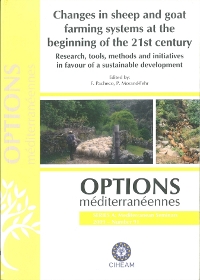| Article précédent | p. 141-144 | Article suivant |
Pastoralism in natural parks of Andalucia (Spain): a tool for fire prevention and the naturalization of ecosystems
The Environment Department of the Government of Andalusia (Spain) has recently undertaken the responsibility of integrating extensive livestock grazing as a tool for fire prevention in several Natural Parks of the region. With the participation of 19 shepherds, 910 ha of fuelbreaks are being maintained by sheep and goat flocks. Their effect is being monitored and specific research is being carried out to adjust the system. In exchange for the service provided, shepherds are paid proportionally both to the surface of fuelbreaks they maintain, and to the biomass control outcome they achieve. This is an extra income that drives their production systems towards sustainable activities integrated in the conservation of forest resources. On the other hand, extensive and scarcely managed forest pine plantations and oak-tree communities are in need of diversification (naturalization) actions. Intense grazing - by domestic or wild herbivores -has always been present in Mediterranean forest and rangelands, contributing to their diversity and dynamics. Therefore, livestock grazing is nowadays a tool that can efficiently collaborate with other initiatives in the naturalization of many simplified forest ecosystems. Both fire prevention and naturalization are main forest management issues in the 21st century, and livestock breeders have the opportunity to team up, enhance their extensive production systems and benefit from the increased social and economical recognition of their activity.
Le Département pour l'Environnement du Gouvernement Autonome de l'Andalousie (Espagne) a récemment pris la responsabilité d'intégrer l'élevage extensif comme outil pour la protection contre les incendies dans plusieurs parcs naturels de la région. Avec la participation de 19 bergers, 910 ha de coupures de combustible sont entretenus par des troupeaux de moutons et de chèvres. L'impact de cette intégration est suivi et fait l'objet d'une recherche spécifique pour ajuster le système. Les bergers sont payés pour le service réalisé proportionnellement à la surface de coupure de combustible qu'ils maintiennent et aux résultats du contrôle de biomasses végétales. C'est un revenu supplémentaire qui conduit leurs systèmes de production vers des activités durables intégrées dans la conservation des ressources de la forêt. D'autre part, les repeuplements de pin et les communautés naturelles de chêne vert ont besoin d'actions de diversification (pour rendre ces surfaces à leur état naturel). Le pâturage intensif - par des herbivores domestiques ou sauvages - a été toujours présent dans les forêts et les parcours méditerranéens, intervenant dans leur diversité et leur dynamique. Ainsi, actuellement, le bétail est un outil qui peut efficacement contribuer avec d'autres initiatives à ce processus pour rendre à leur état naturel de nombreux écosystèmes simplifiés de forêt. La prévention contre les incendies et le processus pour rendre ces surfaces à leur état naturel, sont les principaux outils de gestion de la forêt du 21ème siècle. Ainsi, les éleveurs peuvent renforcer leurs systèmes de production extensifs et profiter de la reconnaissance sociale et économique de leur activité.
- [ Afficher ]
- [ Télécharger ]
- [ Exporter la citation ]
Vous pouvez télécharger la citation au format :
- [ Imprimer ]
-
Mots-clés
AMENAGEMENT FORESTIER, CONSERVATION DE LA NATURE, ELEVAGE EXTENSIF, ESPAGNE, PREVENTION DES INCENDIESCiter cet article
Ruiz-Mirazo J., Robles A.B., González-Rebollar J.L. Pastoralism in natural parks of Andalucia (Spain): a tool for fire prevention and the naturalization of ecosystems. In : Pacheco F. (ed.), Morand-Fehr P. (ed.). Changes in sheep and goat farming systems at the beginning of the 21st century : research, tools, methods and initiatives in favour of a sustainable development . Zaragoza : CIHEAM / DRAP-Norte / FAO, 2009. p. 141-144. (Options Méditerranéennes : Série A. Séminaires Méditerranéens; n. 91). Proceedings of the Seminar of the Subnetwork on Production Systems of the FAO-CIHEAM Network for Research and Development in Sheep and Goats, 2007/11/15-17, Ponte de Lima (Portugal). http://om.ciheam.org/om/pdf/a91/00801138.pdf



